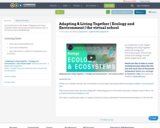
An introduction to the chapter "Adapting and Living Together" within the Ecology and Environment topic of the virtual school GCSE Biology.
- Material Type:
- Diagram/Illustration
- Lecture
- Syllabus
- Unit of Study
- Date Added:
- 02/21/2013

An introduction to the chapter "Adapting and Living Together" within the Ecology and Environment topic of the virtual school GCSE Biology.
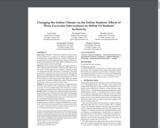
Although CS Education researchers and practitioners have found ways to improve CS classroom inclusivity, few researchers have considered inclusivity of online CS education. We are interested in two such improvements in online CS education- besides being inclusive to each other, online CS students also need to be able to create inclusive technology.

"Safe and Inclusive Online Learning: The Sophie Handbook for Schools" is the intellectual result of "SOPHIE – Safe and Inclusive Online Learning in Primary Education," an Erasmus+ project.>> Free download: https://www.sophieproject.eu/results

This learning object is an interactive PowerPoint tutorial addressing effective communication practices to be used by online instructional personnel.
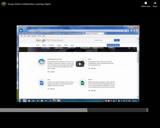
Video about group online collaboration in Social Media; Google Docs; Video Conferencing; and Virtual Worlds
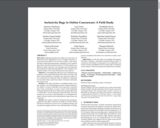
Research paper about gender-inclusivity issues found in online CS courses---an an automated tool (AID/Courseware) for detecting those issues.
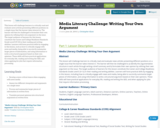
This lesson will challenge learners to critically read and evaluate news articles presenting different positions on a single issue that the learner takes interest in. The learner will then be challenged to formulate their own opinion by refining their own argument on the issue. The target audience of learners for this lesson constitute the Career and College Readiness Standards Grade Level E (9-12) in their reading and writing abilities. Learners will hone practical skills by engaging in this lesson, such as how to critically engage with news and media, being able to succinctly summarize larger pieces of information, and using information to write a structured argument based on their own opinions. These skills will have practical applications for everyday life, reading and writing the GED, and when applying for jobs that require information processing.
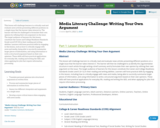
This lesson will challenge learners to critically read and evaluate news articles presenting different positions on a single issue that the learner takes interest in. The learner will then be challenged to formulate their own opinion by refining their own argument on the issue. The target audience of learners for this lesson constitute the Career and College Readiness Standards Grade Level E (9-12) in their reading and writing abilities. Learners will hone practical skills by engaging in this lesson, such as how to critically engage with news and media, being able to succinctly summarize larger pieces of information, and using information to write a structured argument based on their own opinions. These skills will have practical applications for everyday life, reading and writing the GED, and when applying for jobs that require information processing.
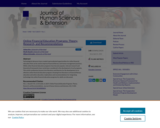
Technological advances have created unprecedented opportunities for online financial education that can be used to improve financial literacy and money management practices. While online financial education programs have become popular, relevant research and theoretical frameworks have rarely been considered in the development of such programs. This article synthesizes lessons from literature and theories for the development of an effective online financial education program. Drawing from literature on financial literacy education and online education, implications and recommendations for integrating technology into online financial education programs for adults are discussed.
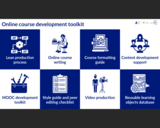
This is a series of micro-courses aimed at lecturers; they cover the basics of online course development.
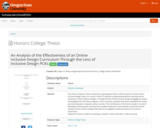
ABSTRACT: The online computer science classroom is growing, but there is little research on how to teach inclusive design online. As a result, online CS students are graduating without learning how to avoid bias in their software designs. Through the lens of the Inclusive Design Pedagogical Content Knowledge (PCK), this thesis analyzes a set of curricular activities that were embedded into online post-baccalaureate computer science courses. The contributions of this work include: (1) a set of takeaways outlining what I learned from student responses to the activities and (2) the second iteration of the Inclusive Design PCKs that can be applied in both the online and in-person classrooms.

This course explores the diverse ways that people teach and learn—in different countries, in different disciplines, and in different subcultures. We will discuss how theories of learning can be applied to a variety of hands-on, in-class learning activities. We compare schooling to other forms of knowledge transmission from initiation and apprenticeship to recent innovations in online education such as MOOCs. Students will employ a range of qualitative methods in conducting original research on topics of their choice.